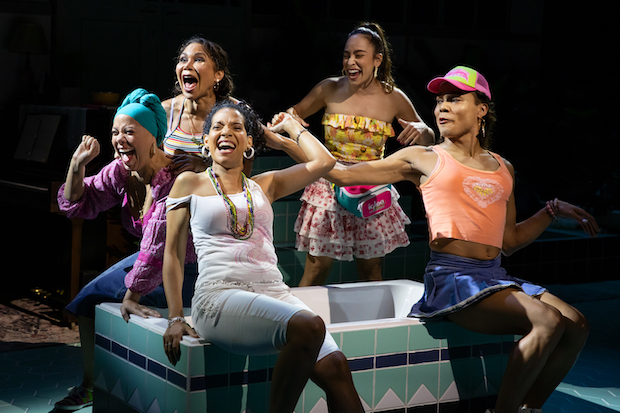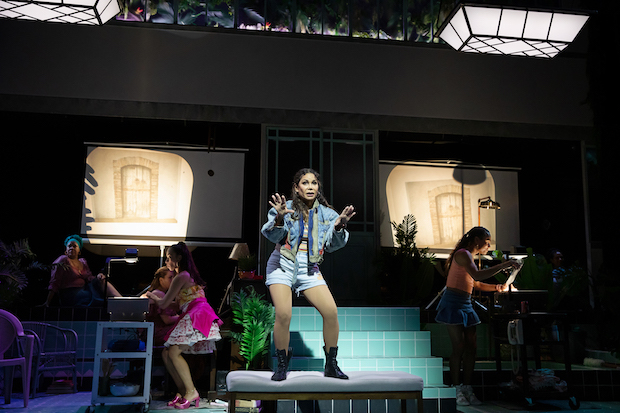Review: My Broken Language Is Quiara Alegría Hudes's Family Love Letter
Hudes continues her Signature Theatre residency with a staged adaptation of her memoir.

(© Julieta Cervantes)
Life is art and art is life in Quiara Alegría Hudes's My Broken Language. A cast of five rotate as Hudes's mouthpiece in this staged version of the playwright's 2021 memoir— the latest product of her Signature Theatre Premiere Residency. As young "Qui Qui," the performers swoon over books like The House on Mango Street and Beloved, while also endowing the booty-shaking among Quiara's Puerto Rican cousins in North Philly with the profundity of high art.
Hudes, who also directs, pours dance, visual art, and music (largely provided by pianist Ariacne Trujillo-Durand) into the production to build a world of senses that the aspiring writer at the center of the story spends her life trying to harness inside a bifurcated language. And yet, through all the sights and sounds, My Broken Language remains stubbornly stuck on the page.
Hudes is best known for her Elliot Trilogy (which includes the 2012 Pulitzer Prize-winning Water by the Spoonful) and for penning the book to Lin-Manuel Miranda's In the Heights. Now jumping into the waters of autobiography, she trades traditional plot for a series of vignettes that depict the culture that gave life and soul to her many celebrated works.
The always compelling Daphne Rubin-Vega tells the story of 10-year-old Qui Qui's first period, which tragically coincides with a hotly anticipated trip to Six Flags with her cool older cousins (the scene concludes with a macabre where-are-they-now, which highlights the carnage wrought by drug culture and the AIDS epidemic in the '80s and '90s); Samora la Perdida delivers a monologue about witnessing her mother's exorcism (Ebony Williams choreographs a stunning physical interpretation of this scene for Yani Marin to perform); and Marilyn Torres takes the lead during a scene in which she discovers her cousin Nuchi (also played by Marin) earned a high school diploma without ever learning to read.

(© Julieta Cervantes)
The interchanging narrators skillfully wend their way through moments of playfulness and gravitas. But the language — which, as the title suggests, is the centerpiece of this theatrical event — ends up being the production's greatest Achilles' heel. The actors speak in thick, descriptive prose, which is evocative on a page, but heavy on a stage. Set designer Arnulfo Maldonado gives us plenty to look at — from a richly decorated altar to tropical plants that encroach on the tiled space (bathtubs are scattered about as if preparing for a group baptism). And still the words never settle comfortably in their theatrical surroundings, as if insisting to be read and not performed.
While the medium and the message may be at odds, the message remains a poignant one— particularly for bilingual or Hispanic audiences who will hopefully make up a greater portion of future audiences than the one I sat in. The standout Zabryna Guevara is assigned the play's most pivotal vignettes, including the final one in which we see Quiara the playwright emerge and form her mission statement as an artist. Inside the white, affluent space that is playwriting graduate school, 26-year-old Quiara establishes herself as a conduit for the unpolished beauty that vigorously molded her. It's a beauty that rarely has a suitable translator to document, let alone disseminate it, and she takes on this job as if it were a sacred duty. Unfortunately, while these ideas ring out clearly, the enveloping spirit of this profound errand has been lost in translation from page to stage.









